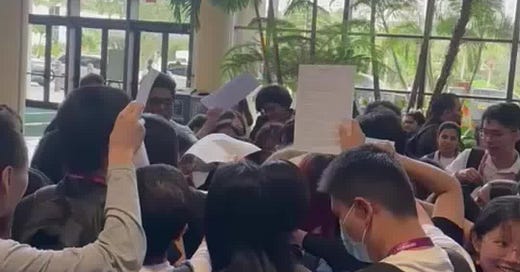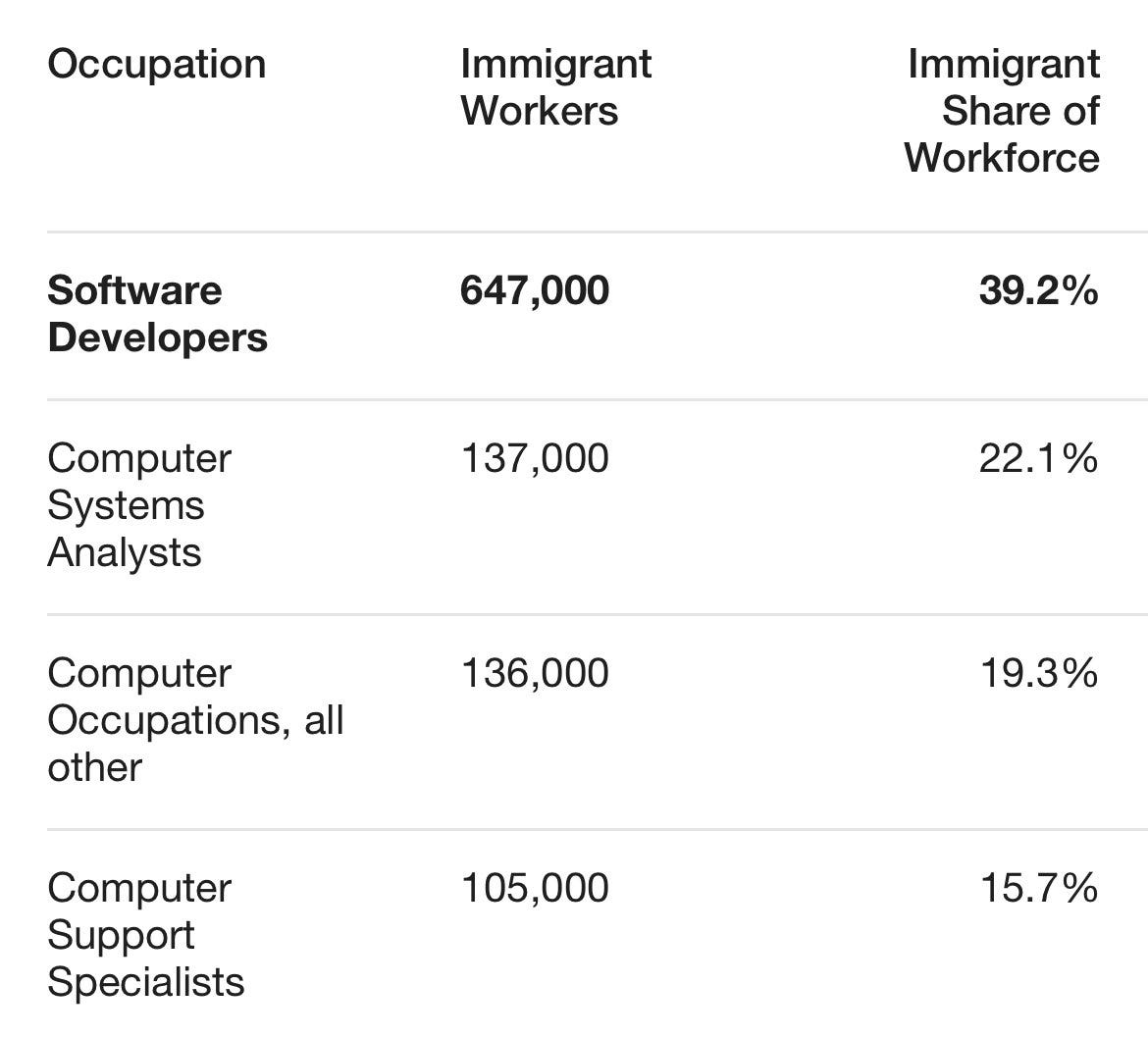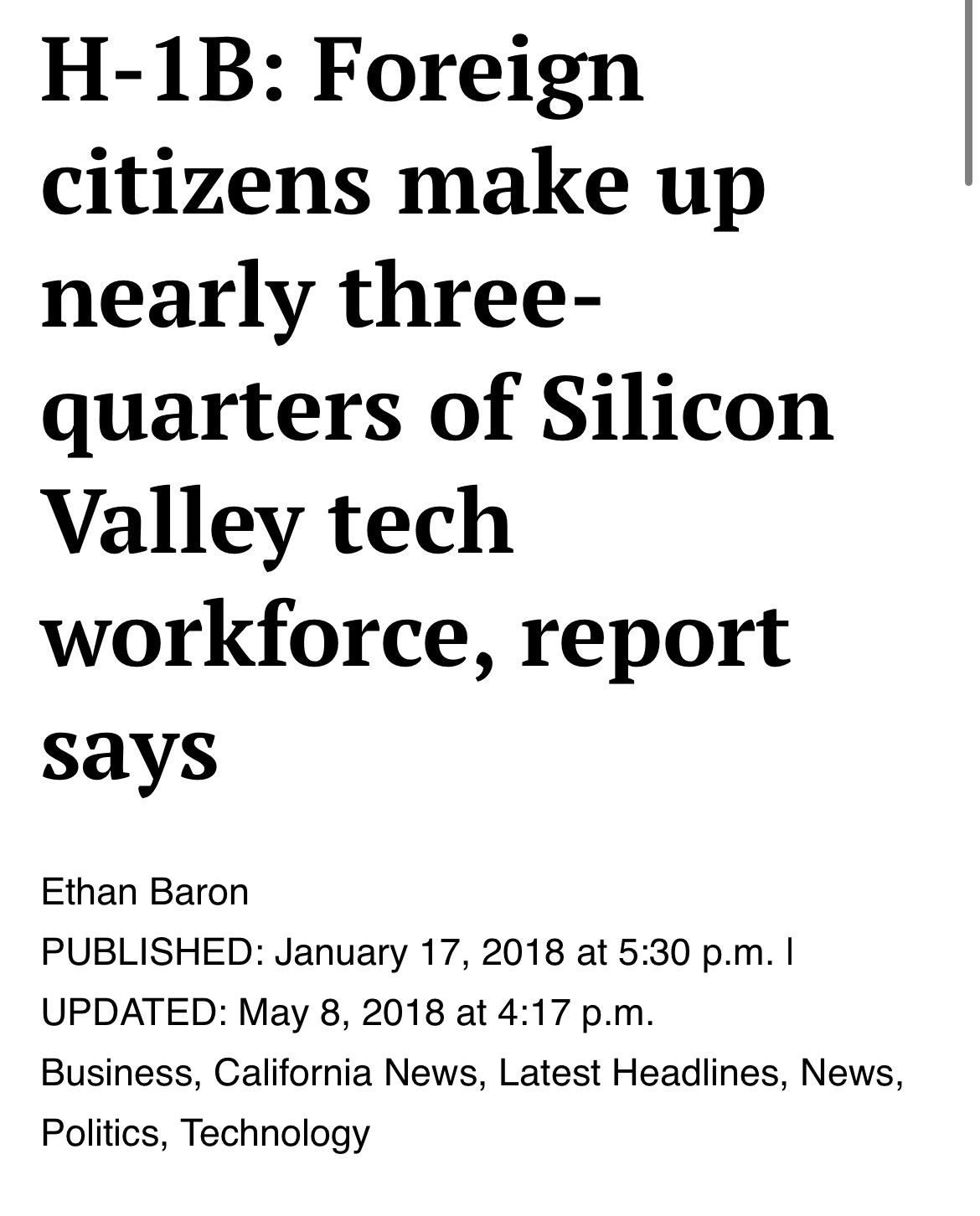The severity of Asian Tech Immigration
Unlimited Sino-Indian tech immigration gives them a majority of jobs and depresses wages by $91,000 per year
The American tech sector has recently been going through what many have dubbed a “tech job recession.” Lay offs are common and hiring has been decreasing. Salaries have decreased by over $10,000 per year.
This hits close to home for someone like me, who graduated with a B.S. in computer science just 5 months ago. What is even worse is the alienation that occurs when a job is actually acquired. I have experienced two academic departments and one West-coast software engineering workplace where easily 90% of employees are Chinese and Indian and 70% or more speak accented English, meaning they arrived in the United States after puberty as economic migrants.
There is a meme among whites who have contact with these migrants that not only are they intellectually alienating to be around, they physically stink because they don’t understand basic hygiene. When they are not stinking up the room, they are often speaking to their racial brethren in their own languages, Mandarin and Hindi. They have extreme in-group bias, often acting incredibly racist toward native White Americans. Most white tech workers, whether leftist or not, would likely choose to work around other whites if they had the opportunity, with wages controlled for. This is what they do in housing, in fact. Leftists commit white flight just as much as non-leftists.
But just being around these economic migrants is only the tip of the iceberg. All white tech workers are paying for these migrants to exist in this country through opportunity cost. The immigration is so severe and uncontrolled that the costs on the average white tech worker are enormous, even if he somehow gets away from the migrants with remote work or a lucky placement.
How many jobs are economic migrants taking in tech?
As I stated above, in my experience, Sino-Indian economic migrants are taking easily more than 90% of positions at high quality companies and academic institutions.
You can see this for yourself without statistics. Recently there was an all-female tech conference called Grace Hopper. Men signed up as non-binary to talk to recruiters and swarmed the conference. Try spotting any white people at this conference, which was held in Florida.
I could not spot any white people.
The general statistics on this are less severe, probably because there are a lot of hidden tech jobs. Almost every large company hires some software developers, and there are still a lot of whiter old cohorts. Among software development jobs, 40% are on H1B visas.
40% on its own is an extreme number that will have significant consequences on white workers. But in Sillicon Valley and FAANG companies, the places with the most prestigious, top paying jobs, it’s way worse.
H1B visa workers alone are 75% of workers. There are many more non-white workers who are not on H1B visas; their parents are often economic migrants, and they are Sino-Indian dreamer babies with “birth-right citizenship”. I have met a number of people like this and they all still send money back to India, visit India for extended periods of time, and harbor resentment against white Americans.
How much does this cost American tech workers?
This massive immigration depresses American tech wages. This is basic supply and demand in the labor market.
Getting rid of H1B workers in tech would remove as many or more people proportionally as the Black Death in Europe, which doubled real wages.
Elasticity numbers concur with this analysis.
Economists typically measure the responsiveness of wages to immigrants using the wage elasticity of immigration—the percentage change in wages one can expect for a given percentage change in the quantity of immigrants. Literature on the U.S. labor market suggests the wage elasticity of immigration is about −0.2, meaning that if the number of migrants were to increase by 10 percent, then wages would fall by 2 percent, on average. However, this average masks substantial disagreements among economists who study immigration. Some economists have found that wages do not change at all with an increased supply of immigrants (Card 1990, Card and Peri 2016). Others, such as Harvard University economist George Borjas, find a greater wage elasticity of immigration that is between −0.3 and −0.4 (Borjas 2003, Borjas and Katz 2007).
If we cut H1B workers by 10%, at the low estimate, wages would increase by 2% on average. The mean software engineer salary in the US is $113k/yr. To take the percent of H1B workers down to about 1, we need to multiply 40 by 0.90^30. In other words, we reduce by 10% 30 times.
This results in wages increasing to 113k * 1.02 ^30 which equals $204k/yr. This is almost a doubling. American tech workers are paying $91,000 per year for the privilege of having unlimited H1B workers around.









It has actually been this way, on and off, for decades. I did my Physics degree 50 years ago and my Engineering Ph.D. 40 years ago. The collapse of the USSR flooded the job market with scientists and engineers for better than a decade - combined with a reduction in government R&D spending, it was very difficult. Even 40 years ago, when I did my Ph.D., most of my fellow graduate students were foreign students. When my son did his BS - MIS and MS - Data Security at the University of Washington a few years ago, most of his fellow students were also foreign born, mostly Chinese and Indians. And the other students in the Honors program in high school that he and his sister attended were ~ 75% the children of highly educated Chinese and Indian immigrants. When he wants, he can speak English with an excellent Bangalore accent. Mind you, the honors classes I attended in high school were majority Jewish, probably children of Holacaust survivors. The popular culture criticizes academic work, so we should expect that the population that takes the harder academic courses is likely to not be representative of the general population.
Certainly immigration has suppressed the salaries of myself and my peers, but being too restrictive might well be worse - further driving the development of large centers of excellence outside of the US. I don't know where the proper balance point it.
Wouldn’t dramatically increased labor costs impact real wages for everyone?